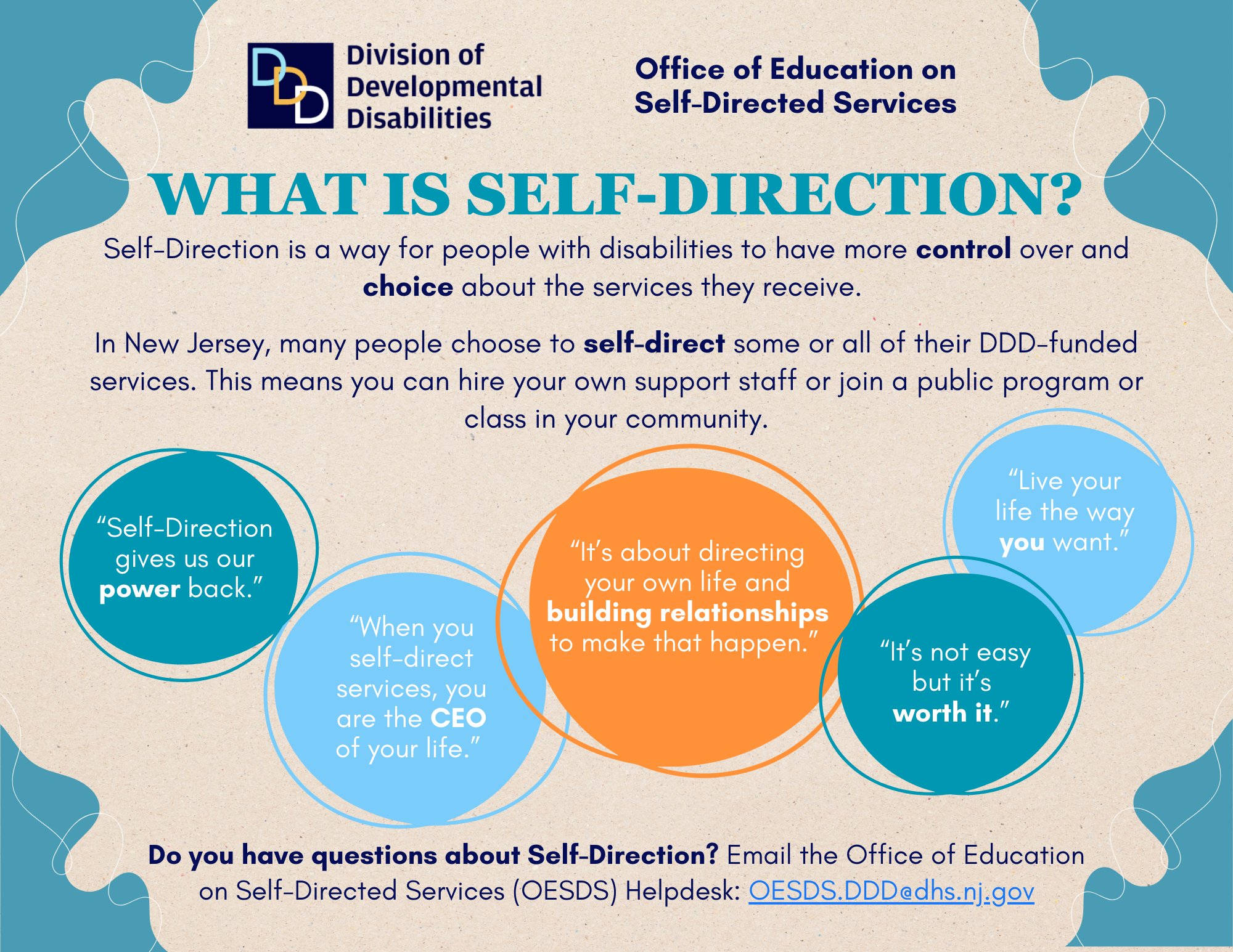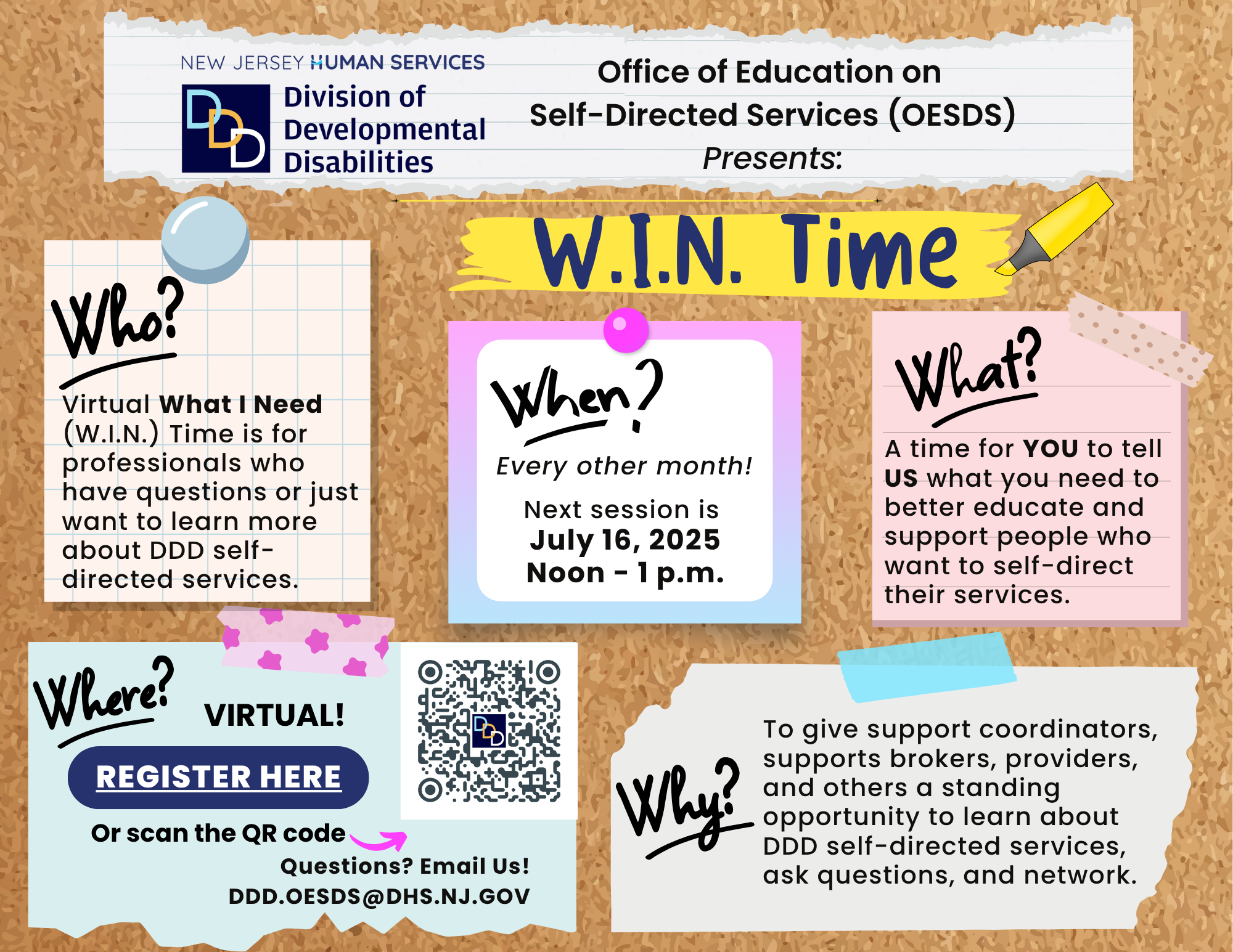Office of Education on Self-Directed Services
The Office of Education on Self-Directed Services provides education and training for people with intellectual and/or developmental disabilities (IDD) receiving services, their families, advocates and support coordinators, as well as community partners and other stakeholders. We do not replace a person's Support Coordinator in planning, but rather serve as an additional support to help people understand how self-directed services can work.
For information about DDD's two self-directed service models, Vendor Fiscal/Employer Agent, administered by PPL, and Agency with Choice, administered by Easterseals NJ, visit Self-Directed Services/Self-Direction.

WIN Sessions for Professionals Who Support Those Who Are Self-Directing Their Services
WIN (What I Need) Time is a virtual opportunity for professionals (Support Coordinators, Supports Brokers, Providers) who support people who are self-directing some or all of their DDD-funded services to ask questions and learn more about DDD self-directed services. WIN sessions occur every other month - usually on the 2nd Wednesday from 12 p.m. to 1 p.m.
Next Virtual WIN Time Session
- Wednesday, January 21, 2026
- 12 - 1 p.m.
- Register for Jan. 21 WIN Session
Family Networking Sessions
The Office of Education on Self-Directed Services hosts networking sessions for people and families who are, or are interested in, self-directing some or all their DDD-funded services. Advance registration is required.
Next Virtual Statewide Family Networking Session
- Tuesday, January 27, 2026, 1–2:30 p.m.
- Online, via Zoom
- Register for Jan. 27 Statewide Family Networking Session
Peer-to-Peer Networking Sessions
Hosted by the Office of Education on Self-Directed Services, Peer-to-Peer Networking Sessions are an opportunity for adults with intellectual and/or developmental disabilities (IDD) who are self-directing some or all their DDD-funded services to meet their peers, share resources and discuss their experiences with self-direction.
Adults with IDD who are self-directing or are interested in learning more about self-direction are welcome to attend.
Next Virtual Peer-to-Peer Networking Session
- Wednesday, January 14, 2026, 6–7:30 p.m.
- Online, via Zoom
- Register for Jan. 14 Peer-to-Peer Networking Session
Education and Resources
Self-Direction Webinar Series
- Introduction to Self-Directed Services
- Learning to Self-Direct Your Services: Enrolling with a Fiscal Intermediary and Recruiting Self-Directed Employees
- Self-Direction Panel Discussion (January 22, 2025)
The Boggs Center Publications
Technical Assistance and Education
The Office is available to provide technical assistance and education, including:
- Guidance and tools on the benefits and responsibilities of self-direction.
- Facilitation of networking meetings with individuals, families, self-advocates and providers.
- Technical assistance for agencies providing or interested in providing Supports Brokerage services, as well as for people and families interested in using the service.
To request technical assistance or education, email DDD.OESDS@dhs.nj.gov.
National Center of Advancing Person-Centered Practices and Systems (NCAPPS) Self-Directed Learning Collaborative

New Jersey’s Membership in NCAPPS Self-Direction Learning Collaborative
New Jersey is a proud member of the National Center on Advancing Person-Centered Practices and Systems (NCAPPS) Self-Direction Learning Collaborative.
NCAPPS is an initiative from the Administration for Community Living and the Centers for Medicare & Medicaid Services that helps States, Tribes, and Territories implement person-centered thinking, planning, and practice in line with U.S. Department of Health and Human Services policy.
New Jersey is one of 23 teams that were accepted into the NCAPPS Self-Direction Learning Collaborative (SDLC). The SDLC brings together teams from 16 states to engage in peer-to-peer learning. The teams collaborate to learn about, test, and implement specific systems change efforts focused on the global aim of enhancing the availability, quality, and access to self-direction. They are guided by best practices and structured to promote and accelerate local efforts.
Current Goals & Priorities
Each state team has chosen one or more focus areas to pursue. New Jersey’s specific goals include:
- Permanently weaving the principles and practice of Self-Direction into New Jersey’s service delivery system;
- Promoting the incorporation of Person-Centered Practices into all facets of our work;
- Providing ongoing education and networking opportunities for individuals and families who are Self-Directing some or all of their services;
- Recognizing the valuable insights of people utilizing services and create opportunities to both amplify the voices of self-advocates and incorporate the lessons, goals, and needs of those with lived experiences into our collective work;
- Developing and disseminating accessible, plain language resources on Self-Direction for people using services, family members, and professionals to learn about its benefits and how it works;
- Engaging in ongoing cultural competency skill building to ensure that we are participating ethically, equitably, and effectively in personal and professional intercultural settings
New Jersey’s SDLC Stakeholders & Member Organizations
Self-Advocates
Family members of people with I/DD
The Boggs Center on Developmental Disabilities
Community of Practice for Supporting Families

Since 2019, New Jersey has been a fully participating state member of The Community of Practice for Supporting Families and was the 19th state to be accepted to participate.
The Community of Practice for Supporting Families exists to enhance and drive policy, practice, and system transformation to support people with intellectual and developmental disabilities (IDD) within the context of their families and communities.
Member states are committed to developing systems of support for families throughout the lifespan. In addition to receiving technical assistance, products, and opportunities for shared learning, member states are supported by a National Team to integrate innovative practices into existing and ongoing state systems change efforts. As an active state member in The Community of Practice, New Jersey strives to enhance best practices for supporting families and encouraging people with I/DD to live their best lives in their communities through utilization of Charting the LifeCourse Tools.
Goals and Priorities
New Jersey’s goals for participation in the National Community of Practice center on people with disabilities and families being fully empowered to communicate their vision for a good life. We also challenge professionals and systems to ask questions, listen, and act on strategies to help people achieve personally meaningful outcomes.
Since joining the CoP, New Jersey’s team has been successful in achieving goals in several key Focus Areas, including:
- Laying the foundation for strong agency partnerships;
- Using accessible, person-centered tools to shift the mindset about how supports are or can be utilized;
- Launching an introduction to Charting the LifeCourse Tools and Community of Practice for Supporting Families principles to all Regional Family Support Planning Councils statewide;
- Integrating Charting the LifeCourse principles across the system and focusing on cross-system communication;
- Establishing a Stakeholder Workgroup and Action Group for CoP activities.
Community of Practice for Bridging Aging and Disability
The National Association of Councils on Developmental Disabilities (NACDD) was awarded a five-year grant for a national Community of Practice (CoP) focused on improving aging services for individuals with intellectual and developmental disabilities (ID/DD), as well as their aging families. New Jersey is one of 15 states participating in the Bridging Aging and Disability Community of Practice.
Statewide Partners (see Aging and Disability State Alliance Team (SAT) Directory pdf)
- New Jersey Council on Developmental Disabilities (NJCDD): Statewide
- Mercedes Witowsky: mercedes.witowsky@njcdd.org
Statewide and Regional Family Support Planning Councils, People First, Partners in Policymaking, advocate for issues that affect people with IDD in their communities.
- Mercedes Witowsky: mercedes.witowsky@njcdd.org
- New Jersey Division of Developmental Disabilities: Statewide
- Patricia Brennan: patricia.brennan@dhs.nj.gov
Supports and services for people with IDD aged 21 and older, education on self-directed services, waiting list, special projects, Community of Practice for Supporting Families.
- Patricia Brennan: patricia.brennan@dhs.nj.gov
- New Jersey Division on Aging Services: Statewide through County Offices
- Andrea Mancini: andrea.mancini@dhs.nj.gov
Administration of a number of federal and state-funded home and community-based programs that make it easier for older adults to stay healthy and live independently as long as possible, and to support their caregivers. Oversight of county offices on aging and other contracted providers that locally offer these services. DoAS also administers programs to help pay Medicare premiums, prescription costs, and other living expenses.
- Andrea Mancini: andrea.mancini@dhs.nj.gov
 Official Site of The State of New Jersey
Official Site of The State of New Jersey